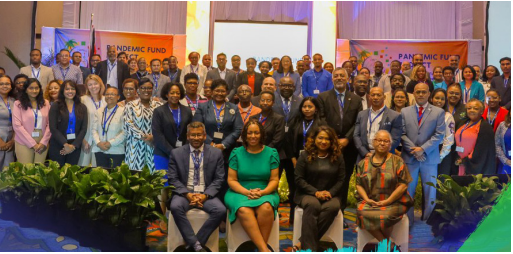Health
Caribbean Public Health Agency Leads Regional Charge Against Pandemics With Pandemic Fund Project

The Caribbean region, known for its vibrant culture and stunning natural beauty, has long been vulnerable to the rapid transboundary spread of infectious diseases. In recent years, the region has faced numerous pandemics and outbreaks, including COVID-19, Cholera, HIV, Dengue, Chikungunya, Zika, Norovirus, SARS, and H1N1, which have had profound human, economic, and social impacts.
However, in a groundbreaking effort to strengthen regional health security, the Caribbean Public Health Agency (CARPHA) has brought together 22 Member States, regional agencies, and international partners to tackle the scourge of pandemics. The three-day Regional Stakeholder Consultation Workshop on the Pandemic Fund Project, held from August 5-7, 2024, at the Hilton Trinidad Hotel and Conference Centre, marked a significant milestone in the region’s fight against infectious diseases.
“The past few years have underscored the critical need for robust mechanisms to respond to global health crises, and the Pandemic Fund Project is a pivotal step in addressing this need, aimed at enhancing our preparedness and response capacities for future pandemics,” said Dr. Mark Sami, Director, Corporate Services, CARPHA, and Chair of the opening ceremony.
The workshop featured keynote addresses from esteemed leaders, including Mr. Terrence Deyalsingh, Honourable Minister of Health, Trinidad and Tobago, who emphasized the importance of regional collaboration in addressing global public health threats.
“Gaps in health systems both nationally and regionally must be reduced to address global public health threats, which we know are almost certain to occur. Through this regional pandemic fund project, the region is in safe hands,” said Minister Deyalsingh.
Ms. Alison Drayton, Assistant Secretary-General, CARICOM, highlighted the significance of the Pandemic Fund Project in safeguarding the health and well-being of the Caribbean people.
“Our region cannot afford to endure the repercussions of another pandemic, which would have devastating impacts on education, healthcare, the economy, and mental health. The Pandemic Fund Project holds immense significance in safeguarding our region’s health and well-being,” said Drayton.
Dr. Lisa Indar, Ad Interim Executive Director, and Project Director of the Pandemic Fund, CARPHA, emphasized the project’s transformative potential in enhancing the region’s response to pandemics.
“The Pandemic Fund Project will change the way the Caribbean responds to pandemics, epidemics, and outbreaks. It will lend crucial impetus to PPR activities that have started at CARPHA, and will result in robust, regional, integrated surveillance and early warning and response systems, and enhanced laboratory and workforce capacities,” said Dr. Indar.
Read also : Caribbean Public Health Agency Donates Essential Supplies To Grenada And St. Vincent After Hurricane Beryl
The Caribbean Public Health Agency’s Pandemic Fund Project marks a new era in regional health security, demonstrating the power of collective action in combating pandemics. As the region moves forward, the project’s success will depend on the continued dedication of all partners involved.
“The Pandemic Fund is excited to support this landmark project. The project’s focus on strengthening surveillance and early warning, laboratory systems, and workforce capacity is vital to building pandemic resilience in the Caribbean. Together, through initiatives like this project, we are laying the groundwork for a safer, healthier future,” said Dr. Priya Basu, Executive Head of the Pandemic Fund at the World Bank.
With the support of the Pandemic Fund, the Caribbean is poised to become a model for pandemic resilience, safeguarding the health and well-being of its people and contributing to global health security.
The Caribbean region’s united effort to combat pandemics through the Pandemic Fund Project marks a significant milestone in the region’s fight against infectious diseases. As the region moves forward, it is crucial that all partners remain committed to the project’s goals, working collectively towards a health-secure future.
“By working together, we can not only address the immediate threats of pandemics but also strengthen our global health infrastructure for generations to come,” said Dr. Mark Sami.
The success of the Pandemic Fund Project will depend on the continued dedication of all partners involved, but one thing is certain – the Caribbean region is now better equipped to face the challenges of pandemics and outbreaks, and is poised to become a model for regional health security
Health
WHO Raises Alarm as Global Cholera Deaths Surge by 50%

WHO Raises Alarm as Global Cholera Deaths Surge by 50%
The World Health Organization (WHO) has raised fresh concerns over the global cholera crisis, revealing that deaths from the disease rose sharply for the second year running, despite the availability of effective prevention and treatment options.
In its latest report released on September 12, 2025, the UN health agency disclosed that cholera cases grew by 5 percent in 2024 compared to the previous year, while fatalities spiked by a staggering 50 percent.
Officially, more than 6,000 deaths were recorded, although WHO warned that the actual toll could be far higher due to widespread underreporting.
The report underscores how a disease once regarded as both preventable and easily treatable is staging a deadly resurgence.
Sixty countries reported cases in 2024, up from 45 in 2023 — one of the widest global spreads seen in recent years.
Alarmingly, 98 percent of infections were concentrated in Africa, the Middle East, and Asia, where fragile health systems, conflicts, and poor access to clean water have left millions vulnerable.
“This disease should not be killing people in the 21st century. We have the tools to prevent and treat cholera effectively,” WHO officials said, linking the resurgence to deeper challenges in sanitation, safe drinking water, and access to equitable healthcare.
The surge in cholera cases comes at a time when many countries are already grappling with overstretched health systems weighed down by other infectious diseases, humanitarian crises, and climate-related disasters.
Experts point to flooding, drought, and mass displacement as key factors creating fertile ground for fresh outbreaks.
WHO and public health experts are now urging urgent global investment in water, sanitation, and hygiene infrastructure, alongside broader vaccine coverage and stronger rapid response systems.
Without these interventions, the organisation warns, the deadly upward trend could persist through 2025 and beyond.
For millions of families, cholera is no longer a relic of the past. It has re-emerged as a present and escalating threat to global health security.
Health
African Health Ministers Adopt Landmark Framework to Tackle Oral Diseases

African Health Ministers Adopt Landmark Framework to Tackle Oral Diseases
African ministers of health have adopted a new regional framework aimed at accelerating action against oral health diseases, which affect about 42 per cent of the continent’s population.
The framework was endorsed on Tuesday at the 75th session of the World Health Organization (WHO) Regional Committee for Africa in Lusaka, Zambia.
It sets ambitious targets, including ensuring that at least half of each country’s population has access to essential oral health services, a 10 per cent reduction in the prevalence of major oral diseases, and that by 2028, 60 per cent of African countries have national oral health policies backed by budgets and trained staff.
Also central to the plan is the integration of noma—a neglected but devastating disease—into national health strategies in at least 50 per cent of endemic countries.
“Oral diseases have been largely neglected, making them among the most prevalent in our region,” said Dr Mohamed Yakub Janabi, WHO Regional Director for Africa.
“Our efforts to address this threat need to be robust, concerted and sustained. The framework agreed today highlights the urgent need for countries to prioritize oral health, ensuring adequate financing, workforce and leadership through a more integrated people-centred approach.”
WHO says oral health must be treated as a key part of universal health coverage.
To that end, it has supported governments with technical expertise, training, and advocacy.
Recent milestones include the abolition of toothpaste tax in Mauritius to expand access to fluoride toothpaste, enrolment of more than 14,000 health workers in WHO oral health training, and progress in securing recognition of noma as a neglected tropical disease in 14 countries.
Senegal’s Health Minister, Ibrahima Sy, welcomed the framework, stressing his country’s commitment to tackling noma and other oral health challenges.
“Senegal has long recognized noma as a critical public health issue. We are committed to ensuring that we are at the forefront of protecting people against oral diseases through a multisectoral approach,” he said.
Despite the scale of the challenge, investment in oral health across the region remains low. In 2019, more than 70 per cent of African countries spent less than US$1 per capita on oral health, far below the global average of US$50.
Only four countries had national fluoride guidelines as of 2023, and the region continues to face a severe shortage of oral health professionals—just 3.7 per 100,000 people, compared to the 13.3 required to meet current service demand.
To close these gaps, the framework outlines five priority actions: strengthening leadership and financing, developing national oral health policies, integrating oral health into essential service packages, bridging workforce deficits through task-sharing, and improving access to medicines and disease surveillance.
Health ministers pledged to mobilize political will, domestic and external resources, and technical expertise to ensure the framework delivers tangible results for millions of Africans at risk of preventable oral diseases.
Health
Experts Warn Untreated Vaginal Infections Can Lead to Infertility, Ectopic Pregnancy

Experts Warn Untreated Vaginal Infections Can Lead to Infertility, Ectopic Pregnancy
Reproductive health experts have cautioned women against neglecting vaginal infections, warning that untreated cases could result in long-term complications, including infertility, ectopic pregnancy, chronic pelvic pain and miscarriage.
The gynaecologists, in separate interviews with PUNCH Healthwise, explained that while many women dismiss early symptoms such as unusual discharge, itching and foul odour, untreated infections often spread from the vagina to the cervix, uterus and fallopian tubes, causing irreversible damage to reproductive organs.
A Professor of Obstetrics and Gynaecology at the University of Ibadan and second Vice President of the Society of Gynaecology and Obstetrics of Nigeria (SOGON), Prof. Chris Aimakhu, noted that infections could be caused by bacteria, fungi or viruses, with some posing greater threats than others.
He said poor hygiene, sexually transmitted infections and bacterial organisms were common sources of contamination, stressing that women were particularly vulnerable to fungal infections such as candidiasis.
“The vagina is an open place that is not protected, and women can have contamination from the outside. The most common fungal infections like Candida thrive easily in moist environments. We also see viral infections such as HIV, human papillomavirus, herpes simplex and hepatitis, though bacterial infections remain the most frequent,” Aimakhu said.
According to him, untreated vaginal infections could escalate into pelvic inflammatory disease (PID), an ascending infection that damages the uterus and fallopian tubes. He warned that PID can lead to ectopic pregnancy, infertility, abscess formation inside the pelvis and chronic pelvic pain.
“Blocked or damaged fallopian tubes are one of the most common ways infections lead to infertility. When the infection ascends, it can block the tubes, preventing sperm and eggs from meeting. This is why childbirth should be conducted in a hygienic environment,” he added.
Also speaking, a Consultant Gynaecologist and Medical Director of The Strong Tower Specialist Hospital and Fertility Centre, Dr. Ayodele Ademola, identified bacterial sexually transmitted infections such as chlamydia and gonorrhoea as the most dangerous for fertility.
“The commonest infections that can affect fertility are chlamydia and gonorrhoea. These are silent and often not detected in routine laboratory tests, but when advanced, they block the fallopian tubes or damage reproductive structures. Fungal infections like yeast infections are common but largely cause discomfort rather than infertility or cancer,” he said.
Ademola further explained that untreated infections could also affect men, leading to conditions such as obstructive azoospermia, where sperm cells are absent in semen due to blocked reproductive passages.
“Untreated reproductive tract infections can cause strictures or damage to passages, making conception impossible. Some infections even affect implantation, such as tuberculosis of the endometrium. This is why treatment should always be handled by specialists,” he warned.
Both experts urged women to seek prompt medical attention rather than rely on self-medication or unverified remedies, noting that early detection and treatment remain key to preventing permanent reproductive health challenges.
-

 Analysis1 week ago
Analysis1 week agoWhy Always Rivers State? By Alabidun Shuaib AbdulRahman
-
News7 days ago
Trump Warns Cuba to “Make a Deal” Or …
-

 Analysis1 day ago
Analysis1 day agoIn Honour of Our Fallen Heroes, by Alabidun Shuaib AbdulRahman
-

 Insights2 hours ago
Insights2 hours agoReframing Nigeria’s Banditry Crisis: From Emotional Narratives to Strategic Clarity
-

 Roots1 hour ago
Roots1 hour agoHow Aswan Connects Women, Film and the World
-

 Diplomacy1 hour ago
Diplomacy1 hour agoIran and the Limits of American Power









